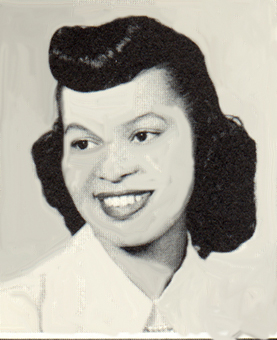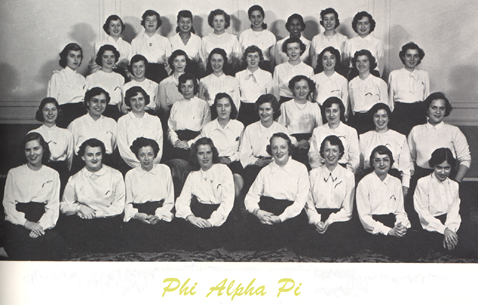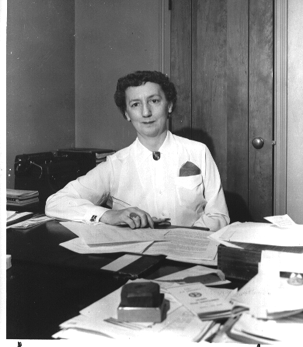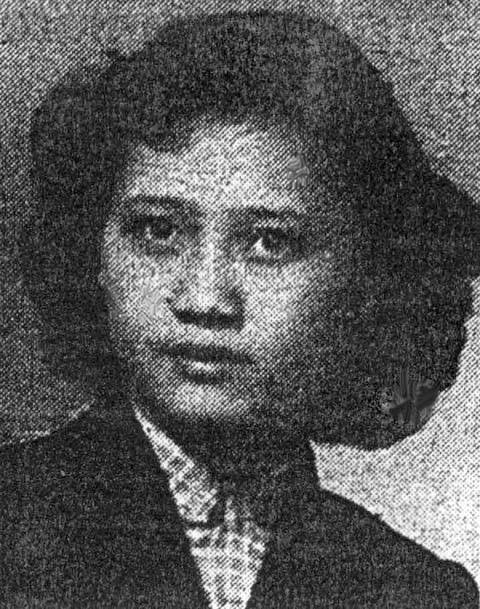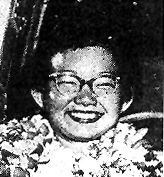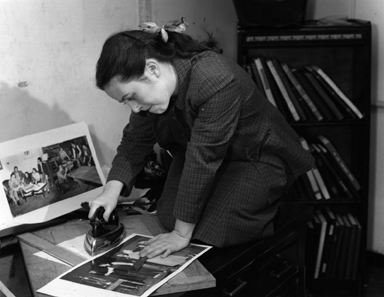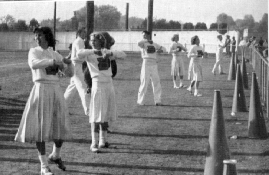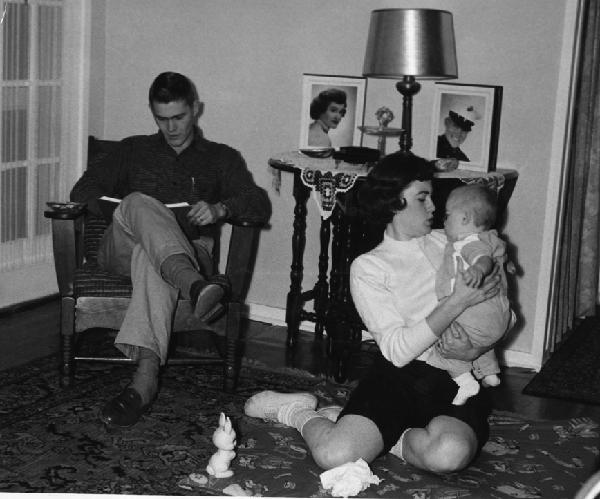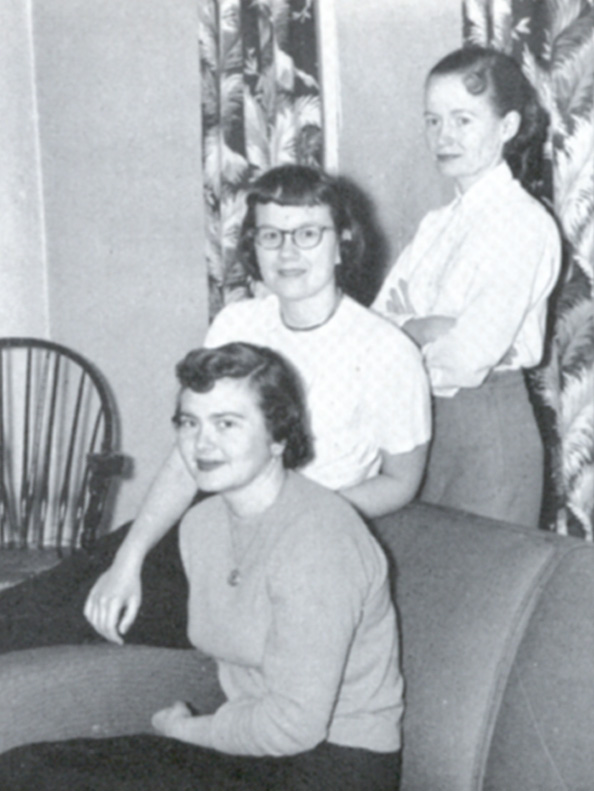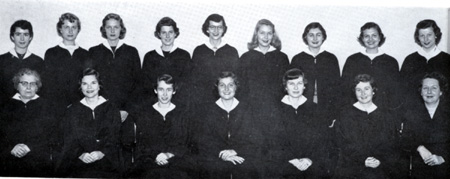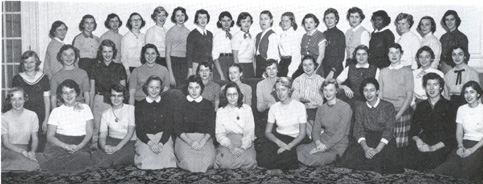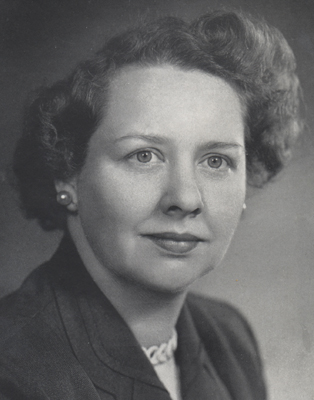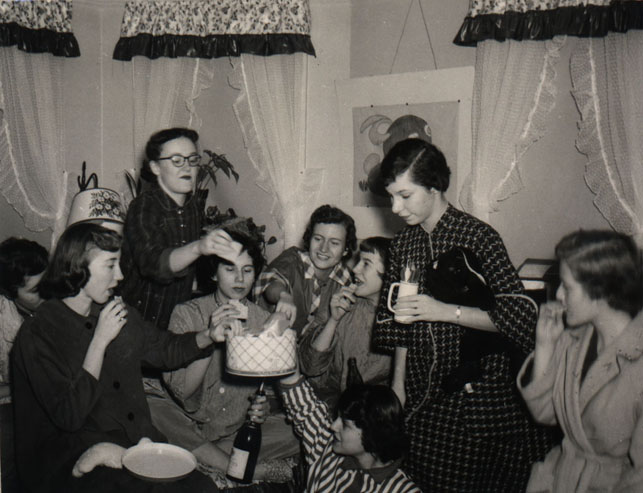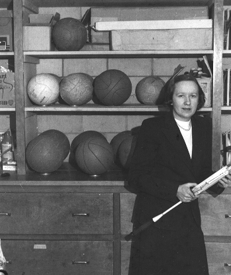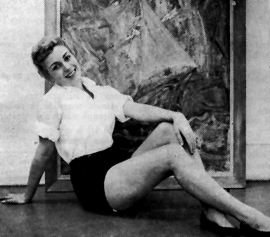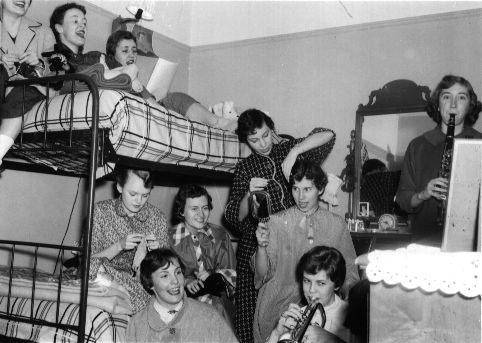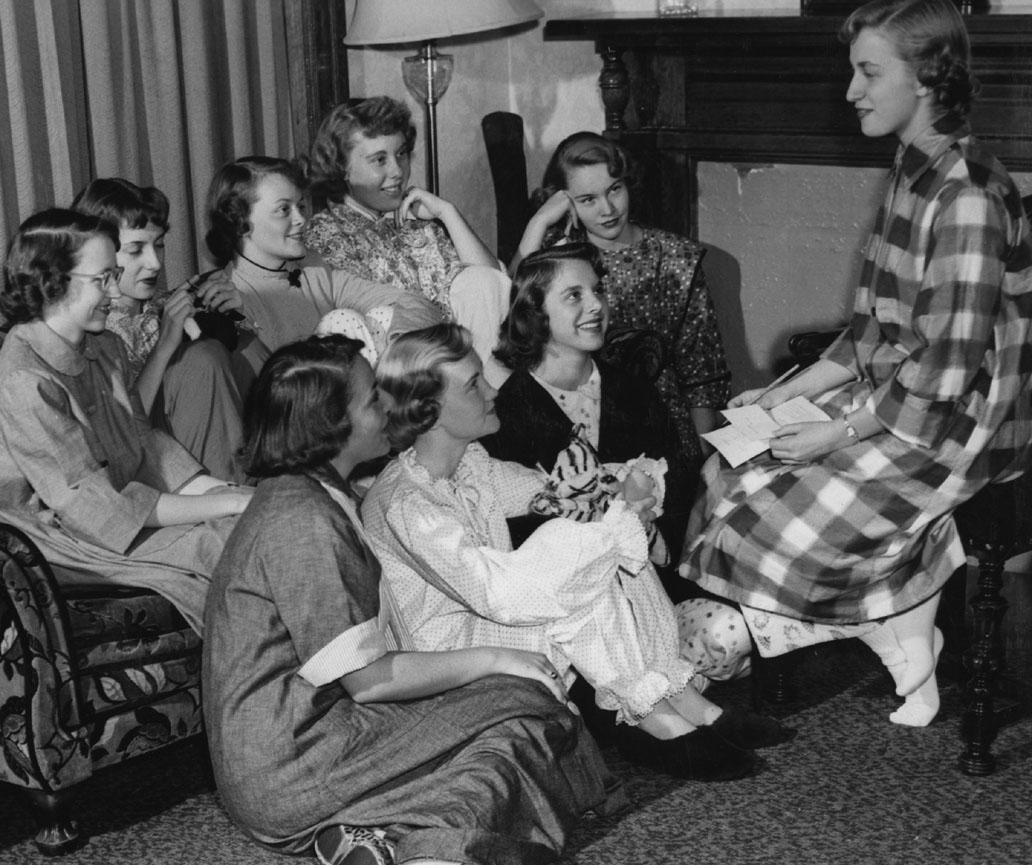
1951-1955
| 1951 |
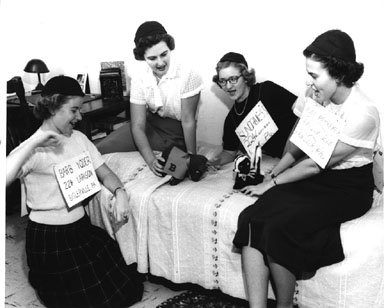 |
Freshmen hazing involves the wearing of beanies, (dinks), singing on command, and displaying your name and address on signs worn around the neck. "Barbara Yoder (left) of Biglerville leads three of her freshman classmates-- Enid Dietrich of New Cumberland, Sundra Ness of York, and Alice Parthemer of Hanover-- in an impromptu practice of Bucknell cheers during a visit to Alice's Larison Hall room. Miss Yoder is the daughter of Mr. and Mrs. Elmer J. Yoder, North Main Street, Biglerville. She is a graduate of Biglerville High School, Class of 1951." Press Release Bucknell University Archives |
|
1952
|
Recollection Dr. Beverly Dunston Scott, class of '52, is elected to the
Bucknell University Board of Trustees in 1977. She recalls
in her 1989 Baccalaureate address: "I arrived in Lewisburg,
wide-eyed, enthusiastic and scared to death. I knew that minority
enrollment was very small, 7-8 students at the time. I later learned
that I was the second Black female student permitted to live the dormitory.
There were no minority staff or faculty at that time either. But these
facts did not bother me because Bucknell was no different than my
grade school and high school in NY. Expect for one important aspect.
I truly believed that because I was entering an institution of higher
learning, I would be taught by and meet faculty and students who respected
truth, openness and freedom. I would not face any form of prejudice
or discrimination. I not only selected my major in the freshmen year,
pre-med, I also selected the most popular national sorority as the
one I would like to pledge. . . . Race and religion determined acceptance
or rejection by national sororities and fraternities. Let me make
it clear, that in this Protestant establishment Jewish people were
only tolerated. What Good Can Come Out of Bucknell |
|
|
1952
|
Recollection Jack Wheatcroft, Professor of English Emeritus, recalls "Trennie Eisley,
who was our Public Relations Officer for many years, I think was excellent
in that job. . . She was thoroughly professional. She was unintimidated
by men. We used to drink coffee in a place called Guy Paynes', which
was a little restaurant right in the middle of campus. And, in that
restaurant there was a back room where the faculty would collect in
the mornings and drink coffee. Every night. . . the place was full of
not only cigarette smoke, but cigar smoke, and there was a lot of faculty
gossip. Trennie regularly would go in there. That particular place which
was a kind of sandwich/coffee shop, was declared off limits for women
students until sometime about 1952-1953. WRC Interview, 4/96 |
|
|
1952
|
An article in The Bucknellian entitled "In Lieu of Sunday Dancing:" "This article is being written in view of the local Sunday night situation at 300 acres. I realize all those who are being duly initiated into our fair universitas...namely the freshmen...are not fully aware of 'ye olde local blue laws' of Lewisburg which prohibit dancing, imbibing, and other interesting pastimes on Sunday. Therefore the ingenious young men of Bucknell have instituted another fascinating diversion...Gravediggers Inc. In order to be a member, co-ed or local lad must have spent one night looking for Christy Mathewson, a renowned honorary member who keeps permanent residence in the cementery, and must be accompanied on this moonlight jaunt by member in good standing of Gravediggers Inc....(of the opposite sex, that is)." The Bucknellian, 10/9/52 |
|
|
1952
|
Lai Ying Tse Letters written by a former Bucknellian describing the University,
its students, and campus life persuaded Lai Ying Tse, a 19-year-old
Chinese girl to come thousands of miles from Hong Kong, China to study
here. George Lum, an engineering student who graduated last year, was
responsible for Lai's choice. She and her family were uncertain of the
American school for her until George convinced them, quite unknowingly,
that Bucknell was the college for Lai. Bucknellian 10/52 |
|
|
1953
|
Hawaiian Girl Takes Junior Year Here "A tiny, dark, smiling part of Hawaii has come to our campus in the person of Jane Toshie Sakamura. Jane calls Lanai, the "pineapple island", her home. It is one of the small islands in the Hawaiian group which is devoted to raising pineapples. She attended school on Lanai until graduation from high school. At that time Jane was awarded a four year scholarship. This scholarship provides for three years at the University of Hawaii in Honolulu and the Junior year at any mainland college of her choice." "Jane has completed two years at the University of Hawaii and has chosen to come to Bucknell for her Junior year. When asked why she picked Bucknell, J ne answered, "because it has everything I want. It is a small Eastern school with a religious background, and it is in a small town which is near several larger towns." Jane, an elementary education major , also found Bucknell's education program comparable to the one they have at the University in Honolulu. The Bucknellian, 10/15/53 |
|
|
1953
|
Recollection Betsy Powers, retired biology lab director recalls: "In each class there was probably a very strong woman student who led most of the others. The first one to come to mind is Jane Brown Maas who is now a trustee. She was here as a little petite teeny bopper. That was really the best description. She was wide-eyed and she wanted to take Chaucer. There wasn't a listing for it. It was in the catalogue but nobody wanted to take it. So she went up to Professor Robbins and said how could I take it and he said you have to have six people. So she rounded up 5 more students and took Chaucer. Her senior year she directed a play. In addition, she was editor of the yearbook, she took Mildred Martin's 9 hour seminar and took a seminar in French I think at the same time. She worked in the Bucknellian and was in every student activity you could think of. She was a dynamo and there were always women like that on the campus. They didn't pay attention to the men who were suppose to lead. They just pushed and they wanted to do things and they did it. She was the first one I was well acquainted with and she graduated in '53. There have been some prominent women at the undergraduate level for a long time. " Women Remember When Series, 9/18/96 |
|
|
1953
|
Bucknell cheerleaders encourage the crowd while watching the game. L'Agenda 1954 |
|
|
1954
|
Bucknell Village Even more set apart than the three hundred acres were the white houses of Bucknell Village. Young marrieds and their families had their own world on the edge of campus. The Wives met to discuss books, sew, or bridge away an occasional hour. The men? They studied hard, and looked forward to the days they would be able to take their places in the world of business. L'Agenda 1954 |
|
| 1954 |
|
Recollection Martha Harris Zeller, who served as an Assistant Dean of Women, in the mid 1950's, recalls that the climate for female students was influenced by the sorority system. "Sororities in the 1950s were very strong. . . and rush was terribly important. It was the job of the Assistant Dean to distribute bids after everyone had gone to bed, and you wandered around from room to room sticking things under the door. They tried to handle it in as humane a way as possible, but I think it was still devasting." WRC Interview, 3/96 |
|
1954
|
We know that the National Association for the Advancement of Colored People is continuing each year to work for better conditions in migrant camps and to support the enactment of Civil rights legislation. We're proud, too, of the Betty Ann Quinn Scholarship Fund. It totaled $2600 when we left, and the interest will be awarded every two years to a worthy student on campus. We tried to put at least $200 into it every year by sponsoring bake sales, dances- and just browbeating parents and friends for contributions. It really was rewarding and fun working with NAACP. NAACP- First Row, Left to Right,- Hadley, Schmidt, Faries, L. Kinzie, E. Cadwallader. Second Row- Slifer, Mackwell, B. Kinzie, Stonham, Ponon. Third Row- McCrae, Justice, Scott, Smith, Jones, T. Cadwallader. L'Agenda 1954 |
|
|
1954
|
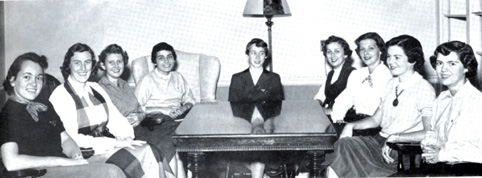 |
A trip to meet the distinguished members of Honor Council was the cause of anxious moments for "first offenders," but it did not take long for us to discover that the girls elected to the council were sincere and understanding people who doled out excuses or penalties according to the seriousness of the offense. The range of problems ran the gamut from Bermuda shorts to coming in after hours. The line waiting outside of Hunt Library was a familiar sight every Thursday afternoon as co-eds prepared to plead their cases. Without Honor Council to act as a judicial body, the social honor system would not have been able to function properly. Honor Council- Left to Right,- Joan Herrmann, Barbara Glenn, June Christ, Ann Gaul, Jay Nides, Chairman; Gretchen Hendricks, Bette Skow, Nancy Nichols, Shirla Williams. L'Agenda 1954 |
| 1954 |
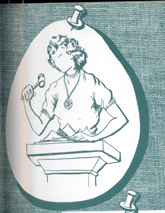 |
Martha Harris came to Bucknell in 1954 as an Assistant Dean of Women. She would later marry John Zeller, a top administrator at the University, and be known as Martha Zeller. There were three assistant deans of women, and each had the responsibility of one of the major women's dorms. At the time, there wre twice as many men as women at Bucknell. Many women went into elementary education or attended Bucknell for two years, then transferred to nursing programs. In the 50s, there were very low expectations that women would have careers. Many women went to college to find a husband, according to Zeller. The life of a Bucknell co-ed was closely monitored at that time. Curfew for women was eight o'clock on weeknights and one or two in the morning on weekends. Female students lived and ate meals separate from the men and had their own student government, honor code, and dress code. Women had their own sense of identity and their own programs. There was no competition with men for opportunities. Women's student government was very successful. The organization, it was felt, promoted camaraderie and respect for rules. Moving Up Day, was a popular tradition for Bucknell women in the 1950s. The ceremony, which honored the seniors, took place in the Baptist Church. The event was planned by students, and included music composed by each class. Seniors processed, followed by juniors, who were moving up in rank. Martha felt that Moving Up Day increased the sense of solidarity among women on campus, and was, therefor, a very positive experience. WRC Interview, 3/96 |
|
1954
|
Recollection Martha Harris Zeller, a former Associate Dean of Women, remembers a particular juncture in Bucknell history. She arrived at Bucknell during the beer roits. In 1954, no alcohol was allowed on campus. As a result, Martha had to chaperone fraternity parties, which was no easy task. One night, campus men organized a protest against the alcohol policy. They went to women's dorms asking for panties to be thrown down. Then, they marched into downtown Lewisburg, yelling, "We want beer!" The Dean of Men was there yelling, "Go back boys, go back!" Women did not participate because the protest began two hours after curfew. WRC Interview, 3/96 |
|
|
1954
|
|
Perhaps the biggest thing that the women students will remember about
their years at Bucknell is the social honor system under which they
lived for four years. Under the supervision of the Women's Student Government
Association, girls elected by the sem-gems to represent them on Senate
and the House of Representatives made the rules which governed their
social world. SENATE- First Row, Left to Right,- Miss Jewell, Nill, Nides, DiOrio, President: Hess, Dixon, Miss Stevenson, Second Row- Told, Steinkemp, Wilt, McColl, Long, Lindberg, Anthony, Martin, Bice. Not Pictured- Keller. L'Agenda 1954 |
|
1954
|
"It is with great pride and humble appreciation that we dedicate the 1954 L'Agenda to Miss Mary Jane Stevenson. A woman of faith and understanding, she has endeared herself to all of us who know her. It was a fortunate day when Dean Stevenson became one of our number. . . Her tireless energy constantly is shown to us on campus by her many duties as advisor to Women Student Government Association, the Christian Association, and other organizations. High ideals and a strong belief in the worth of each student as an individual have made Miss Stevenson beloved and respected by all Bucknellians. But more than anything else, Dean Stevenson has become a symbol to us of all that is kind and good." L'Agenda 1954 |
|
|
1955
|
"Hope these cookies are non-fattening." L'Agenda 1955, University Archives |
|
|
1955
|
Margaret "Peg" Bryan, head of the women's physical education department, is pictured with some of the original women's sports' equipment. Women's sports and recreation is primarily dependent on funds allocated through the student government to the Women's Recreation Association. Later, in the spring of 1970, women's intercollegiate sports requests and receives a budget of $16,700, nearly a 70% increase over the previous year. The money goes toward the purchase of new equipment, including shoes for field hockey and basketball. "Since men are provided with shoes, we felt obligated to request shoes," Bryan said. The Bucknellian 10/70 |
|
|
1955
|
The "Engineer's Choice" becomes a regular feature of the Bucknell Engineer magazine. "In each issue is a photo layout highlighting a pretty young woman from the College of Arts and Sciences. The little text that there was, included the young lady's height, weight, hair and eye color, class year, hobbies and measurements. In 1961, . . . the magazine replaced the title with 'Miss Bucknell Engineer.' The title change was just that. The girls that appeared in this spot were all non-engineers, except one in 1969." | |
|
1955
|
Dorm Life. . . "Down by the Riverside. . ." L'Agenda 1955 |
|
|
1955
|
Dr. Mildred Martin is made full Professor of English in June. Having received her bachelor's, master's, and doctorate degrees from the University of Illinois while working as a secretary and teaching assistant, she has been teaching English at the University for 15 years and working in the summer Bucknell Institute for Foreign Students. She was named Assistant Professor in 1945 and Associate Professor in 1948. Public Relations, L'Agenda 1955 |
|
| 1955 |
Recollection Mildred Martin is rememberd by two former non-traditional women students. Eloise Mallinson, '29, returned to Bucknell as an English graduate student in 1950. Katherine Wheatcroft, '75, present advisor to The Bucknellian and lecturer in English, is also a former Bucknell graduate students. As students, both women shared the challege of balancing school work with a home and family. Mrs Mallinson recalls, "I was so mad at [Mildred] one day. I had . . .I don't know whether I chose it or whether she assigned a subject for a paper for her course, and I found that I just couldn't find anything on it. And, I went in to talk to her about it, and I said, 'Dr. Martin, I have a problem.' She said, 'Oh, you always have a problem. Now me, I haven't a problem in the world.' And I thought, 'You don't have two children to raise and do graduate work, Dr. Martin!' I was mad enought to throw something at her. But I got over it and admired her immensely. She was a brilliant woman, and as I say, the best questioner I ever sat under. She, by questioning, could lead you to the answer of her first question so deftly that you felt you'd done it all yourself. But she was really awfully good at it. I admired her immensely. It was an experience to have a class with her." Mrs. Wheatcroft remembers her similarly, "I took [Mildred's] very, very difficult course. It was tremendously demanding. I had two children and a household to run, and obligations of entertaining for the university through my then husband's career here. And, I was very buys, and it was hard for me to take that class and fulfill it as well as I wished to do it. Mildred wasn't very patient with that. She didn't think in terms of my double life. And, what was interesting was that twenty-five years later, Mildred said to me one day, 'I want to apologize to you for being insensitive to all the work that you had to do as a wife and mother and also to be a student.' I was astonished! I never thought she had ever paid attention to it. But I was aware that Mildred, as a single woman, didn't think that was very important and really thought that that life was getting in the way of my academic work." WRC Interviesw 2/96 |
